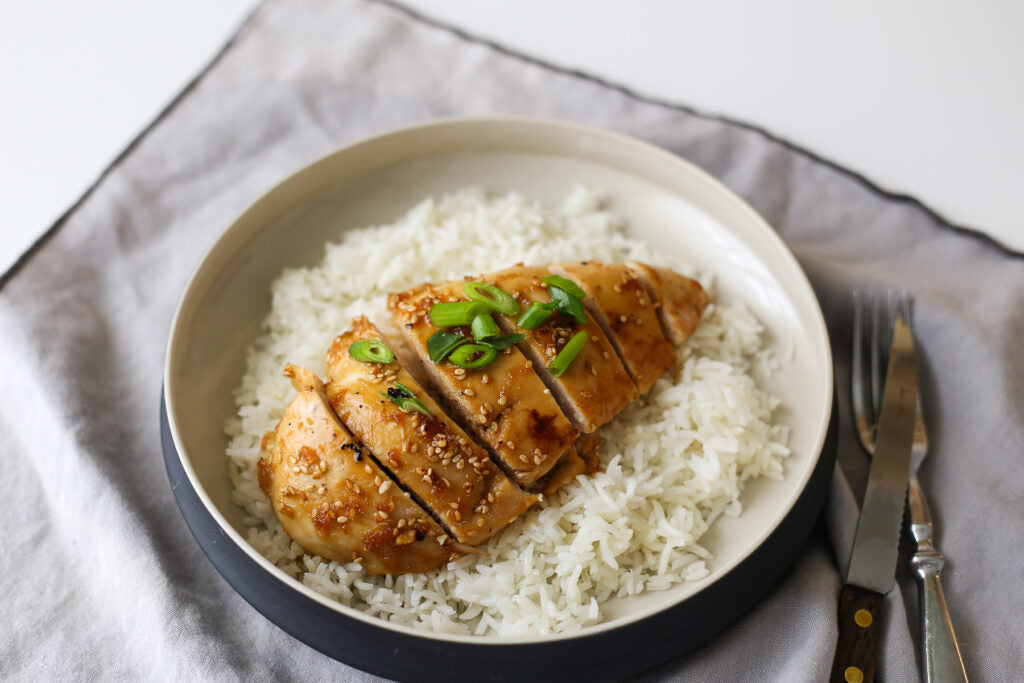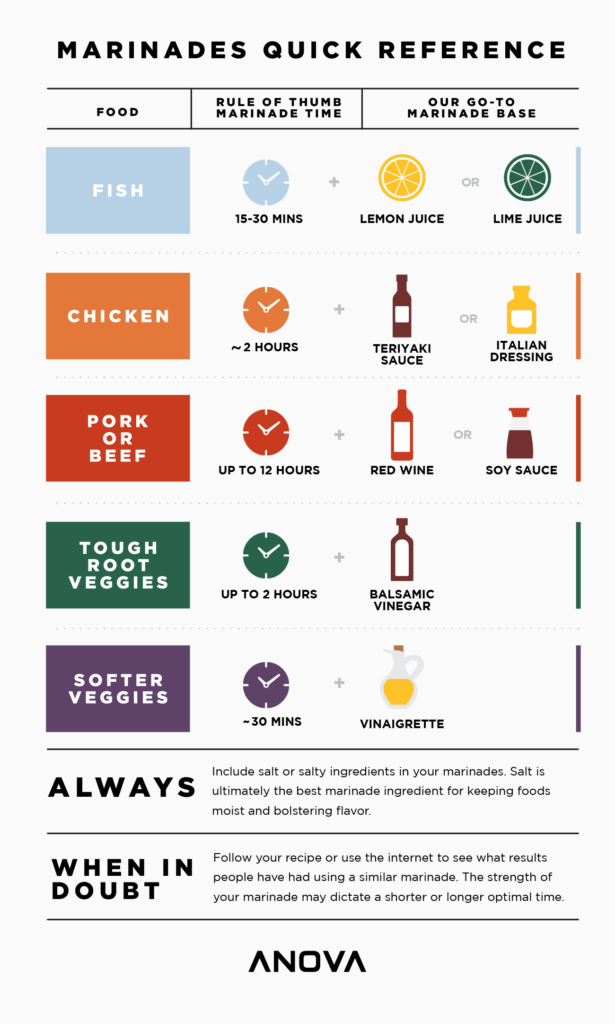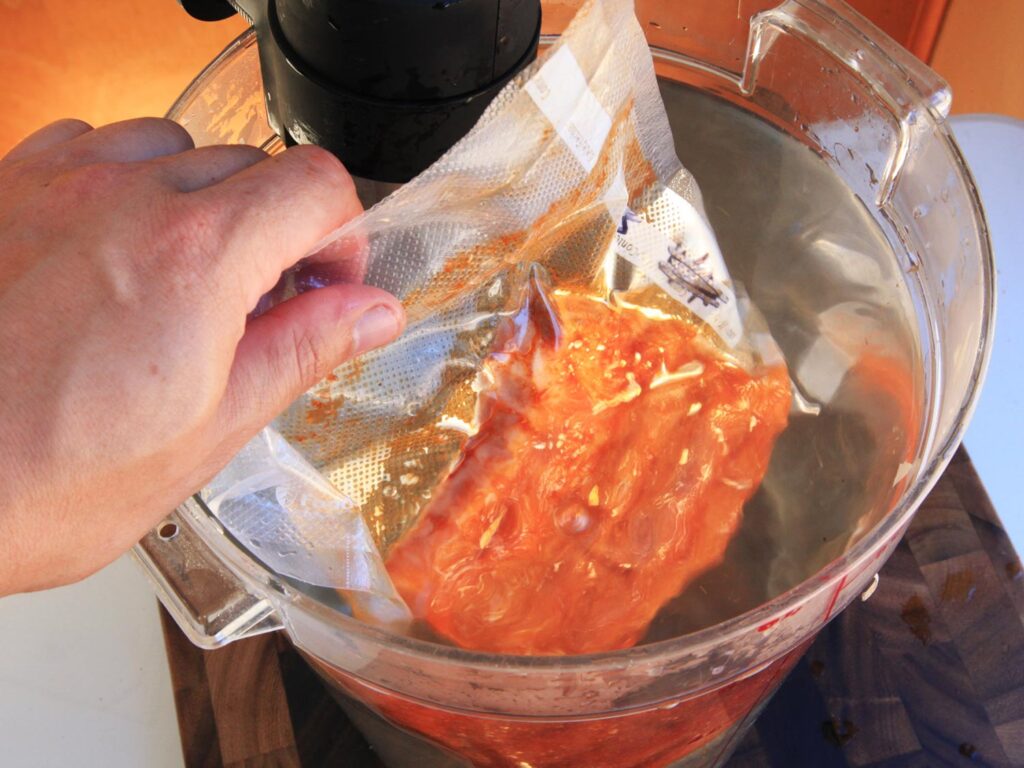This week we're settling some of the hardest-hitting questions and myths in the marinade game. If you've ever found yourself wondering things like "How long should I marinate this for?" or "How does a more acidic marinade impact my finished meal?" then this one's for you.
We've even developed a marinade cheat sheet to help out when you just need a quick reference on general marinade recommendations. Feel free to go ahead and print it out so you can stick it on your fridge like the little piece of functional art that it is.
Why Marinate?
What do marinades actually do?
First, and most obviously, they flavor your food. The acids and aromatics chosen for your marinade work to gradually penetrate the surface level of your food and impart their own distinct flavors.
Second, they can help to tenderize food. The addition of acids like vinegar, wine, and/or citrus juice can help to break down tough or gamey cuts of meat to a more desired texture, but beware — meats left to marinate for too long may become overly mushy or tough depending on the nature of your marinade. Pro tip: Use pineapple juice! Pineapple juice does way more than add a nice tropical touch to your flavor. It also contains an enzyme called bromelain, which dissolves collagen fibers — tenderizing your meat to the max and enabling it to absorb even more flavor.
Third, because marinades usually contain salt, they can also act like a brine — preserving moisture in the food you’re marinating. How? The presence of salt alters the structure of some proteins in the muscle. This also creates more gaps to be filled with marinade, storing additional moisture.

Do all foods benefit from a marinade?
The short answer is that the benefits of a marinade are all down to the food you’re marinating, what you’re using to marinate it, and how long you choose to marinate it.
Meats that are bland and/or super easy to dry out on the grill (we’re looking at you, chicken breast) are some of the best candidates for marinating — benefitting from moisture retention and added flavor during the grilling process. Having said that, over-marinating is most definitely a thing. Aromatics from marinades don’t actually seep their way that far into the meat; in fact, they are only able to penetrate just a few millimeters below surface level. Because of this, a shorter marinade time of around an hour can be just as effective as several hours, especially when dealing with more delicate foods, such as fish.
The amount of time used to marinate different cuts of meat can make or break your marinating experience. Too long in an acidic marinade can affect the protein structure of your meat, leading to an undesirably tough texture. Too long in an enzymatic marinade like pineapple juice can break your food down past the point of enjoyable — crossing over from perfectly moist to outright mushy.
General rules of thumb:
Keep this marinate reference guide on your fridge:


Myth: Chamber or vacuum sealing will help your marinade seep into your food faster.
In the myriad of marinade myths, this is perhaps the biggest of them all and we’re happy to bust it. The answer is no, but both of these options can be more efficient because, in an airtight environment, you’ll need less marinade to fully coat your protein or vegetable. Plus, you don’t have to worry about your bag leaking all over your refrigerator.
Why doesn’t it speed the process up? Meat marination is a chemical, not physical, process — just because the marinade is pulled tightly against the surface of your meat, it won’t force the liquid into the pores of the food. There’s no way to make that happen any quicker than the chemical process allows, so airtight seals aren’t a magical solution to making your meat quickly imbibe its marinade.

Can I sous vide my food in marinade?
Technically, yes and no. Flavor-boosting marinades without a lot of salt and citrus are fine to cook in due to their mild nature. Those with tenderizing or brining capabilities (and also alcohol) will be detrimental to the food, as it will cause over-marination. Another thing to note is that cooked meat doesn't absorb marinades, and the outside of meats cook in roughly 5 to 10 minutes sous vide, so you always want to marinate first before sous vide cooking — even if you leave the marinade in the bag.

Can I marinade in anything that will hold liquid?
Although we wish you could, there are definitive restrictions that you need to keep in mind when it comes to marinade containers. Reactive metals and glazes can impart unwanted, dangerous chemicals into your food when they come into contact with acid from marinades. Check out the list below for our safety recommendations.
Don’t use:
Do use:

What are some of the best recipes to get me started?
Unsure of where to begin the road to marinade mastery? Try some of our community favorites from the Anova recipe site.
Precision™ Oven Recipes:
Sous Vide Recipes:


5 comments
‘Cooked meat doesn’t absorb marinades’. Isn’t that what you do with escabeche? I plan to marinade the leftover half of a pork loin to use in a stir fry later. Perhaps it will taste good even if it’s just surface coated?
I met someone who explained this to me. Very interesting
Marinades, particularly those with vinegar or citrus (acidic) and salt, will initiate a chemical reaction that tenderizes meat by breaking down proteins. However, the reaction doesn’t stop entirely; it just slows down significantly over time. Initially, the acids will rapidly start breaking down the proteins, making the meat tender, but if left too long, it can result in a mushy texture.
The timing depends on the type of meat and the strength of the marinade. For example:
Fish only needs 15-30 minutes.
Chicken can take 2-4 hours.
Tougher cuts of beef might be marinated for 12-24 hours.
After a certain period, the acids will have done most of their work, and the effect of the marinade will plateau, but the flavor absorption may continue at a slower rate.
My son and I cooked chicken strips in fajita seasoning mix and olive oil in our sous vide tank recently and they turned out delicious! Due to the pressure and movement of the water in the tank the strips became a roll but once the cook time was done we simply broke it up, mixing the seasonings with the strips, and they were so tender and flavorful! I’m a little confused about not marinating in a bag (We used the water displacement method of sealing). Did we get lucky that we didn’t get sick?